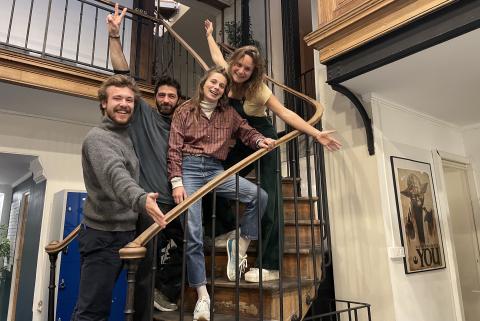
“Our strength is in establishing connections to avoid creating more waste.”
June 22 2023Did you know that 900,000 tons of the waste produced each year is from furniture alone? This waste, which is less talked about than food or textile waste, is a real issue and has a significant impact on the environment. It weighs heavily on the finances of businesses, which are responsible for dealing with goods ordered online that have been returned to their warehouses. That, of course, was before Olympe Chabert and Ariane Varale launched their start-up, SmartBack, which aims to give the best possible second life to returned furniture—all locally. We talked to Olympe, one of the co-founders and a graduate of AgroParisTech.
Hello Olympe. Before we find out about SmartBack, could you tell us a little bit more about your own career?
O.C: Before creating SmartBack, I completed a dual degree program at AgroParisTech and HEC Paris. At HEC Paris, I wanted to acquire some business skills and at AgroParisTech, develop skills in engineering and define my projects through a degree in Food, Biomolecules, and Energy Engineering, with a specialization in Product Design and Development. I knew early on that I wanted to work on projects related to waste and the circular economy, recovering products that would otherwise have become waste, but I didn’t yet know which industry I would end up in. I love the challenges facing the food industry, but Phenix, TooGoodToGo, and others had already managed to secure a solid foothold in the area of food waste. Once I had become a Master’s student in entrepreneurship, I took advantage of a student project to go and explore all the types of non-food waste produced by major French manufacturers. With my friend Ariane Varale (co-founder of SmartBack), I visited a lot of warehouses and factories all over France to learn about the different types of industrial waste out there (boat hulls, wind turbine blades, etc.), always with the same objective: recovering waste. One of these visits gave us an idea. The CSR Director of a major furniture firm told us about a problem that was a lot more serious than industrial waste—the destruction of products that are practically brand new, e-commerce returns which for the most part could not be sold again or could only be sold at a ridiculously low price.

And that’s how you started the SmartBack project with Ariane Varale…
O.C: Yes, Ariane and I started at the beginning of the Covid crisis, right at a time when people were taking the time to refurnish their apartments and houses during the lockdowns. But when there’s a surge in online orders, that also means a surge in returns! And even more waste… By approaching the parties involved in the industry and discussing with them, we started to have a clear vision of what we needed to do: for each piece of furniture returned by a customer, we needed to find someone locally with the capacity to recover it (associations, second-hand shops, restaurants, hotels, etc.). And so we developed a national network of parties involved in the Social and Solidarity Economy (SSE) who were interested in these returned goods, as well as a tool to automate the process. We know that our success will depend on the fact that we provide the best possible response to the needs of everyone involved in the returns process. For sellers, it’s about getting the best possible price for an item that was originally going to end up in a waste-treatment facility; for customers, it’s about knowing that the furniture they choose to return will be collected quickly and put to good use; and, at the end of the chain, for shops and partner associations such as Emmaüs, Petits Frères des Pauvres, and the Red Cross, it’s about ensuring that we send furniture they want in their direction…
The strength of our model comes from staying local: each major brand only has one big warehouse in France where all returns are sent. This means that transport costs are often huge and we save on these by recovering all returns locally. This also ensures a much lower carbon footprint, cutting the distance traveled from around 360 miles to 15 miles—primarily thanks to the 650 partners in every region of mainland France who have placed their trust in us.
Have you had any feedback from the people you work with?
O.C: Yes, and they are very satisfied. For example, we always start a three-month trial period with the online retailers we work with: 100% of them have continued to work with us after the trial period and have found that the tracking system and dashboard we have created is very useful and easy to operate, with genuine traceability of the item’s second life! As far as our second-life partners are concerned, we generate very precise product information for them so that they know exactly what they are buying or taking on.
What are your ambitions for the future?
O.C: We would like to go even further with the recovery of returned furniture: we want to work on reconditioning damaged furniture, which is already done in the household appliances sector, for example. We want to support big brands in the area of second-hand sales and repairs by setting up profitable circular business models. Our strength is in establishing connections between people and creating top-performing tech and logistics tools to avoid creating more waste and to forge synergies that are a win-win for everyone involved.
In addition, our team is growing rapidly and we regularly recruit interns and permanent staff to support our double-digit growth. Drop us a line if you want to help us build the e-commerce of the future!

